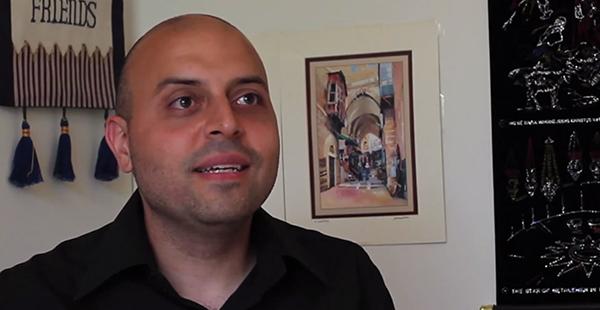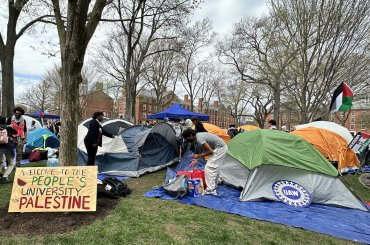In an attempt to foster critical thought on campus and include pro-Palestinian viewpoints, Wellesley Students for Justice in Palestine (WSJP) has been dragged into a larger set of administrative issues that are out of our control, and falsely accused of contributing to a growing hostile and anti-Jewish environment on our campus. We feel compelled to address the repeated attempts to slander our premises, goals, and work toward the improvement of Palestinian and Israeli human rights.
During its first semester on campus this fall, 2014, WSJP has engaged in self-education as well as the planning and implementation of three different educational initiatives: the “A Name to the Number” poster campaign, the “What Does Zionism Mean to You?” poster campaign, and a public lecture on nonviolent movements wherein Israelis and Palestinians co-resist the occupation. Both poster campaigns were supplemented with publicized statements addressing their intentions, which were respectively released online on October 22 and November 20.
In an article titled, “Wellesley College fires Hillel staff as Jewish students face upped anti-Israel activity,” written by Debra Nussbaum Cohen and published in Haaretz on November 21, WSJP actions were misrepresented as hostile. While we empathize with Jewish students whose religious leadership is in transition at Hillel, we would like to point out that we have no input in such decisions, and our actions have been exaggerated disproportionately and represented inaccurately. We agree with Ms. Cohen’s statement that at times, “intense anti-Israel sentiment bleeds into anti-Semitism.” We have, however, carefully monitored our efforts to assure this is not the case with our work. With a full understanding of these concerns, we emphasize that the central goal of our actions is to resist all forms of oppression – not just anti-Palestinian animus, which we see too often on this campus, but anti-Semitism as well.

In our programming, we seek to open the campus to challenging and respectful public discourse. Our “What Does Zionism Mean to You” poster contains a disclaimer that reads, “Please be respectful. Anti-Semitism, Islamophobia, and racism will not be tolerated.” In this way, we created an open discussion encompassing a variety of perspectives that reflects and represents the diversity of our community, while also being respectful. Additionally, we invited Professor Sa’ed Adel Atshan, human rights activist and professor of Peace and Justice Studies at Brown University, to speak at Wellesley on November 13. In his lecture, entitled “On Heroes and Hope: Nonviolence and Resilience in Israel/ Palestine,” Atshan spoke of various Israeli and Palestinian community leaders who are striving to create a reality where both communities, and the minorities within them, can coexist in a way that serves justice. Following the lecture, students engaged in discussion with Professor Atshan, free to ask questions on points of contention; they were met with thoughtful responses. Yet the fact that some found this lecture and discussion to be “extremely destructive” suggests a sense of unwillingness to engage with ideas that challenge one’s opinions and call for cooperation and coexistence.
Despite attempts to foster a public discourse, our actions are deemed destructive by a handful of very vocal students and adamant supporters concerned with alleged discrimination towards the Jewish Community. Comments that portray Wellesley SJP, its programming, and anti-Israel criticisms as “menacing” threats to safety and security are anti-Arab and reinforce a racialized image of the Other, thus perpetuating cycles of hatred and violence. Additionally, this racialized language, positing WSJP as monolithically “Arab,” as opposed to the supposedly universally pro-Israeli Jewish student, must be challenged if one is to find truth in this discourse. Wellesley SJP strives to question this racialized polarization in all possible ways: in reality, our membership is composed of students from various racial, religious and nonreligious, and ethnic backgrounds, and our programming enables the expression of diverse voices from the conflict. Paramount to our mission as an organization is the realization that racist hegemony must be dismantled if justice is to be achieved.
While a handful of Wellesley’s Jewish students, wrongly claiming to speak on behalf of the entire Jewish community, has vocalized that the campus climate is now “difficult,” a Jewish WSJP member who would like to remain anonymous asserts that, “The existence of Students for Justice in Palestine has created a comfortable space for me, as a Jewish student who stands for Palestinian human rights.” Wellesley SJP has served to incorporate pro-Palestinian freedom viewpoints, which have often been excluded from the discussion of the Palestinian/Israeli conflict at Wellesley. In fact, it is the small minority of Palestinian and Arab students on our campus who often feel most marginalized as a result of the policing of discourse, such as is exhibited in the bigoted backlash we’ve faced with our programming.
Just as Wellesley SJP condemns the racism and discrimination underlying many of the policies of the state of Israel, Wellesley SJP also categorically opposes all forms of prejudice or discrimination based on race, religion, ethnicity, gender, or sexuality. We believe values and standards of integrity and respect should apply across the board, to all political issues and to all those who seek to discuss them.
Eliza Marks, Nour Azzouz, and Mallika Govindan are three of the founding members of Wellesley Students for Justice in Palestine, a student organization started in September.



Great work, great piece!
Thank you, WSJP.
“in reality, our membership is composed of students from various racial, religious and nonreligious, and ethnic backgrounds, and our programming enables the expression of diverse voices from the conflict. Paramount to our mission as an organization is the realization that racist hegemony must be dismantled if justice is to be achieved.”
I took the liberty of googling these fine students and authors~ impressive.
Thank you again.
This story beautifully details what we all suspected, that there was quite a bit on demonizing going on in an attempt to prevent a pro-Palestinian message from being aired at Wellesley. You’re fighting for your cause in the best possible way.
In a maybe not-off topic aside, I can’t help but thinking where alum Hilliary would come down on all of this.
“Yet the fact that some found this lecture and discussion to be “extremely destructive” suggests a sense of unwillingness to engage ”
Rather than “found”, use “stated” or, better, “claimed”. In fact, use “without elaboration or explanation claimed”.
Same thing with asserted feelings of unsafety on campus. These are “unsubstantiated claims”, “statements offered without justification or explanation.”
I think the next program, here, for WSJP and others at other campuses, is to challenge the complaining students to come before an open meeting and explain just what’s wrong with the discussions, and why they claim to feel unsafe on campus as a result.
What would be the result if (with somewhat better reason) WSJP members stated that professions of Zionism on campus made them feel unsafe?
Kudos to the members of WSJP for standing up to the Zionist machine that is attempting to shut down discussion of Israeli apartheid on the Wellesley campus~!